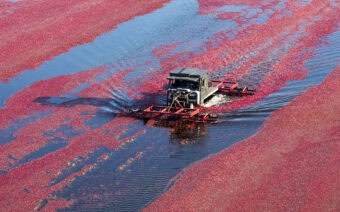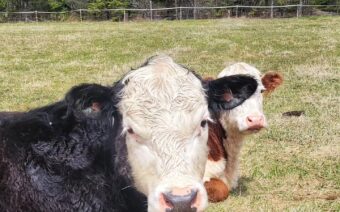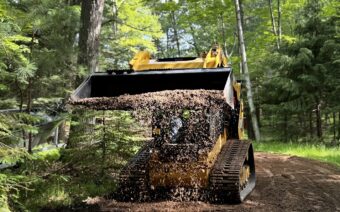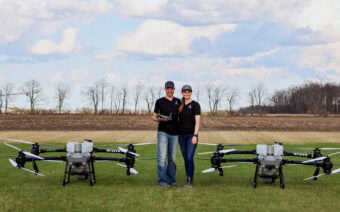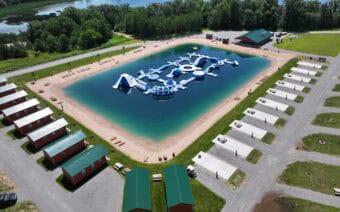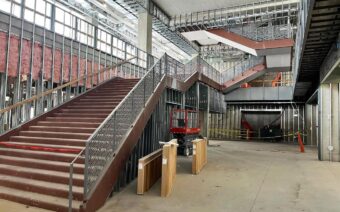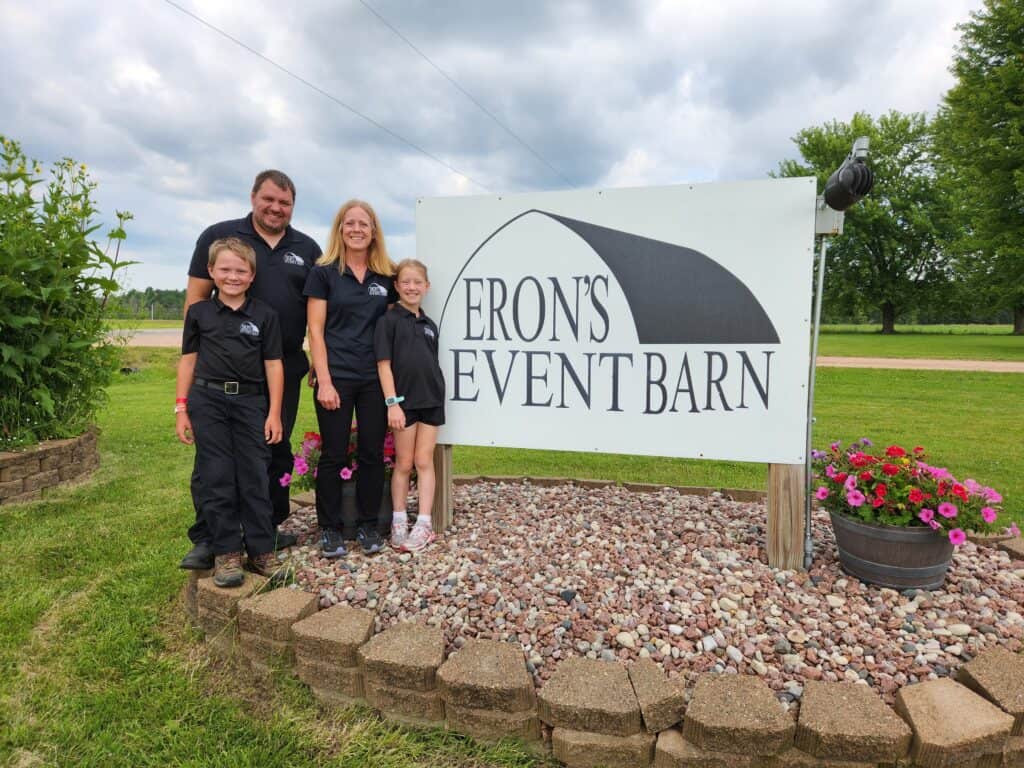
August 5, 2024
STEVENS POINT – Since 2016, John and Melissa Eron have hosted more than 170 weddings at their barn, Eron’s Event Venue (3471 County Road C).
The pair, however, said they didn’t originally plan on getting into the wedding industry.
In fact, Melissa said she and John both grew up on dairy farms as children.
The land the venue barn sits on, John said, was bought with farming in mind.
“It was a sizable chunk of farmland with buildings that were available, and I was interested,” he said. “I bought it for the sole purpose of farming here for cash crops.”
The barn at the time, John said, was more of a hassle than it was a benefit.
“It was actually at a point where I was looking at just bulldozing it, getting it out of the way,” he said. “We really didn’t have a purpose for it… so the first couple years (after we purchased the land), the intent was to remove the barn.”
However, the Erons said the commodity market in 2014 caused them to pivot.
John said hay prices were at a point where someone could buy better quality hay out of state, and it would be cheaper than growing the hay themselves.
“I do a bunch of custom work for local dairy farms, and so they had us come out, and we chopped off the first crop (of) hay,” he said. “After that, they put corn (in all of their fields).”
No hay, John said, meant no work for his employees until harvest time in late September.
“We took out a small business loan to (fix up) some (of the) buildings around here…,” he said. “We started… doing a little work on the roofing, on the flooring – just keeping it in decent shape.”
John said he “didn’t think much of it” until the winter of 2015.
“A family friend had a venue booked, basically like a park shelter,” he said. “But the bride really wanted a barn, and they asked if they could use ours… I thought it was the silliest thing ever.”

John said his friend offered to help him do some work on the barn if he allowed them to use it.
“He worked with us all winter,” he said. “We redid the flooring, and didn’t do much beyond that. We ended up renting out some porta potties – kind of a one and done deal for a barn wedding.”
Then, John said, more and more people started asking about using the barn as a wedding venue.
“It was a very simple ‘no’ for a while,” he said. “Then I thought, ‘well, maybe, I don’t know. I guess this would be fun.’ We don’t go out that much, so it’s neat to have people come to us.”
One thing led to another and in 2016, the couple officially started Eron’s Event Barn.
A full-service wedding
From the beginning, Melissa said it was important to set the guideline that the family would only do one wedding per weekend – Friday through Sunday.
“We have two children, so it works best for us not having the extra stress and trying to find people to help flip things,” she said.
Scheduling a couple for the whole weekend, she said, also allows for her and John to get to know the couple, their friends and family much better.
“It’s much less stressful on them, just being able to come in on Friday,” she said.
With about 95% of the weddings having the ceremony on-site, Melissa said a typical wedding weekend schedule looks like this:
- Friday: Rehearsal dinner, bring as much supplies, decor, etc. as possible
- Saturday: Wedding
- Sunday: Clean up/take down, gift opening
John and Melissa said for them, it’s more than just scheduling a wedding date for the bride and groom and providing them a spot to get married.
“We really pride ourselves on being a very hands-on couple,” she said. “We work with the couples a lot. Our joke always with them is that, ‘you don’t have to hire a wedding planner, because that’s our job.’”
Recommending vendors, creating itineraries and proofing wedding invitations are just a few of the things Melissa said they will help couples out with, if they need.
“We live right on the property… so we’re there for them all weekend long…,” she said. “John always says that the bride and groom are in their own little bubble the day of their wedding, and they don’t realize all the extra stuff that we do behind the scenes, making sure their day goes (well).”
John said though it’s important to keep the wedding party happy, it’s also important that the guests are happy, too.
“There’s not many people out there, I think, (that) really have it in them to tell the bride, ‘we can do this thing that you want, but this is the experience your guests are going to have if you do that. If you make some small changes with things, you could potentially have a far better experience with the guests,’” he said.
Examples of this, Melissa said, include having tubs of bottled water available for outside ceremonies, using a golf cart to transport guests to the ceremony area or the barn and having parking attendants.
“We observe and are aware if they need some extra help…,” she said. “Are you looking for the bathrooms? Do you have a gift that you need to drop off? Do you need to head out to the ceremony area? Just being around and present, I think, makes a big difference.”

Melissa said she and John will even lead a wedding rehearsal, if needed, as she said a lot of the ceremonies held at the barn are by officiants who have never done a wedding before.
“The bride and groom feel more comfortable doing that – we’re happy to help take care of those ins and outs,” she said.
John and Melissa said their kids are also involved with the business – helping clean up and move around tables and chairs when needed.
“A lot of guests think it’s cool that the kids are part of it,” John said.
The event space can accommodate up to 300 people, and also has a large bridal suite – which Melissa said has two salon chairs, a big counter and mirrors for the bridal party to get ready.
The groom and his party have an area to get ready in as well.
In addition, John said the barn also has a larger family room for the wedding party, and a prep kitchen area.
“We have a lot of folks who will bring in subs…,” he said. “It’s nice to have snack trays, fruit trays – things like that.”
John said he often tells brides that weddings were never intended to be complicated, “but people are complicated.”
“So, we can work out those fine details ahead of time, and then the people are far more relaxed,” he said.
The barn is open year-round for weddings, and though the winter isn’t the peak season for people to get married, John and Melissa said winter weddings are some of their favorites.
“They’re some of the most fun, because it seems like during the spring, fall and summer, more people have other places that they want to try being, because there’s so many things going on – whether it’s other weddings, graduation parties, things like that,” John said. “(In the winter), they’ll come for the ceremony, and they’ll be here for the whole thing… People don’t seem as anxious to leave.”
More than weddings
When John and Melissa aren’t helping brides and grooms on their special day, the couple said they will use the barn for other events – conservation education being the biggest one.
“We do a lot of youth education with agriculture…,” John said. “That’s part of what we really like doing – working with all the school groups and giving them the opportunity to ask questions.”
John, who is a part of and leads the Mill Creek Watershed Council, said though some farmers may not be available to be physically present at the farm, he’s able to video chat with them so kids can ask questions about farming “while they’re out planting their fields.”
According to Eron’s Event Barn’s website (eronseventbarn.com), the conservation programs can be adapted to cover a variety of topics, such as healthy productive soils, cover crop demonstrations, groundwater/watersheds and best management practices.
John said some years there have been 500-plus students that come out to the farm.
“We sneak (the conversation education programs) in as much as we can – we don’t charge for any educational stuff,” he said.
John said they have also hosted events to raise funds for the Humane Society.
“We donate the entire facility, our staffing and everything (for the event),” he said.
Farming – honest work
Being both farmers and event venue managers, John and Melissa said they’ve got their hands full.
“The joke is we farm seven days a week, and on the eighth day we do weddings,” John said.
John said – to the best of his knowledge – Eron’s Event Barn is one of the few event barns left in the state that is located on an active farm.
At this point, the farm, he said, is “more of a traditional corn, soybean program.”
“We do cover crops as much as possible,” he said. “We intercede when we can. Unfortunately, we run into issues with some bad weeds, like waterhemp and other weeds that have become resistant to herbicides. A lot of those weeds are really hard to kill with cultivation, because we could kill them – but we’d end up killing our intended crop.”
John said the farm does use herbicides, but he tries to use more of the old fashioned methods – such as cover crops – as much as possible.
“We also incorporate a lot of no-till into the program when we can,” he said. “But years like last year, when it was nice and dry and then we got rain when it came time for harvest, our fields got rutted up a bit from trying to harvest.”
When that happens, John said the soil becomes uneven and compacted, and “we have to do some type of tillage to alleviate that.”

“We like to call it rescue tillage – we only hit the areas that we need to hit,” he said.
John said unfortunately this year, about a third of the farm does not have a planted crop.
“Going into the spring, it’s been so wet,” he said. “I’ve got about a third of my farm that we had planted into a really heavy rye cover crop last year, and we never had a chance to get out there and plant (a crop) this year.”
If he would have muddled the soil – “so to speak” – John said he would have been able to have planted, but “that’s not financially beneficial to do, and it’s rather environmentally irresponsible.”
“We have insurance on it that, if we can’t plant, we at least get some of our input costs covered,” he said. “The intent here, within the next couple of weeks, we’re going to go out there and mow the stuff down, and let that rye seed reseed itself for next year and start over again. Hopefully next year, we have a good plant season.”
When it comes to farming itself and educating the next generation and the community, John said it’s important to him to be “absolutely crystal clear” and honest about how he cares for the land, his conservation efforts and the challenges he faces as a farmer.
When children ask hard questions about agriculture, he said, “we just try to be straightforward and honest with them.”
“That’s what’s so great about our local farmers around here, is working with school groups,” he said.
A future with more free time
As John and Melissa continue to work on the farm and run their event venue business, the pair said they are also working on trying to find ways to have more time with their children.
“They’re getting to that age where they love working at the barn helping out with stuff, but they’re starting to realize none of their friends do that,” John said. “We don’t live in a society where children understand work ethic anymore… so we’re trying to figure out what we can do with our children, (and still) have them help at these events.”
For example, John said he and his son have been spending time restoring some old Massey Ferguson tractors.
“That’s become our hobby,” he said.
Melissa said they are also already working through bookings for 2026 weddings.
“People are planning that far out,” she said. “So, it’s hard for us to plan (for free time), minus taking full weekends off on our availability.”
John said the family just had its first weekend off for the first time in a long time, and “had absolutely no idea what to do outside of farm work.”
“We were like, ‘we need to do something, this is our only Saturday in how many months,’ and we had no idea what to do,” John laughed. “We were scrolling through the internet to see if there was anything going on. It’s a farmer’s life.”
 Bringing big city-style treats to Sheboygan
Bringing big city-style treats to Sheboygan 80 years, five generations, two families, same recipes
80 years, five generations, two families, same recipes


